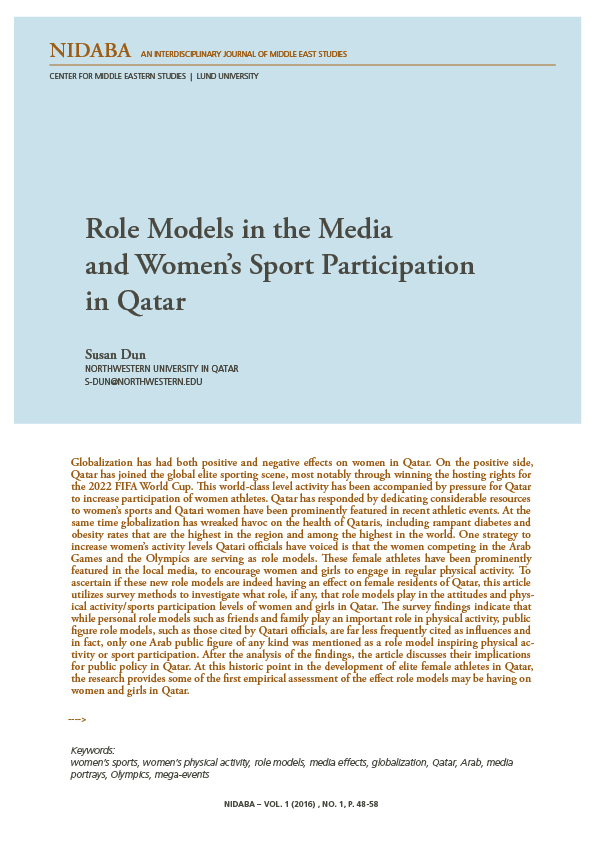Abstract
Globalization has had both positive and negative effects on women in Qatar. On the positive side, Qatar has joined the global elite sporting scene, most notably through winning the hosting rights for the 2022 FIFA World Cup. This world-class level activity has been accompanied by pressure for Qatar to increase participation of women athletes. Qatar has responded by dedicating considerable resources to women’s sports and Qatari women have been prominently featured in recent athletic events. At the same time globalization has wreaked havoc on the health of Qataris, including rampant diabetes and obesity rates that are the highest in the region and among the highest in the world. One strategy to increase women’s activity levels Qatari officials have voiced is that the women competing in the Arab Games and the Olympics are serving as role models. These female athletes have been prominently featured in the local media, to encourage women and girls to engage in regular physical activity. To ascertain if these new role models are indeed having an effect on female residents of Qatar, this article utilizes survey methods to investigate what role, if any, that role models play in the attitudes and physical activity/sports participation levels of women and girls in Qatar. The survey findings indicate that while personal role models such as friends and family play an important role in physical activity, public figure role models, such as those cited by Qatari officials, are far less frequently cited as influences and in fact, only one Arab public figure of any kind was mentioned as a role model inspiring physical activity or sport participation. After the analysis of the findings, the article discusses their implications for public policy in Qatar. At this historic point in the development of elite female athletes in Qatar, the research provides some of the first empirical assessment of the effect role models may be having on women and girls in Qatar.
Authors retain copyright and grant the journal right of first publication with the work simultaneously licensed under a Creative Commons Attribution License that allows others to share the work with an acknowledgement of the work's authorship and initial publication in this journal.
Authors are able to enter into separate, additional contractual arrangements for the non-exclusive distribution of the journal's published version of the work (e.g., post it to an institutional repository or publish it in a book), with an acknowledgement of its initial publication in this journal.
Authors are permitted and encouraged to post their work online (e.g., in institutional repositories or on their website) prior to and during the submission process, as it can lead to productive exchanges, as well as earlier and greater citation of published work (See The Effect of Open Access).
The journal provides open access to all accepted manuscripts in hopes of facilitating an exchange of knowldge and informed discussion about the Middle East. Publishing with Nidaba, authors agree to the terms of the Creative Commons Attribution-NonCommercial-NoDerivatives 4.0 International License, which allows others to share the work with an acknowledgement of the work's authorship and initial publication in this journal. Authors retain the copyright to their manuscript and grant the journal the right of first publication.
The content of this journal is licensed under a Creative Commons Attribution-NonCommercial-NoDerivatives 4.0 International License.

